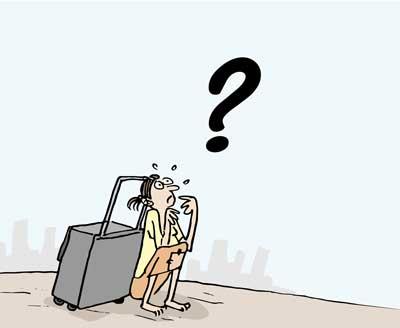Reply To:
Name - Reply Comment
Stories about Sri Lankan migrant workers, especially women left on roadsides in Kuwait after being stranded went viral, first on social media and then carried in the mainstream media this week. Veracity of those stories has to be guessed on the basis of the deafening silence maintained by the authorities on these stories. Video footage showed how young women were sitting on the pavements along with their baggage after being evicted by their employers in that country. Also the footage showed people purported to be Sri Lankans begging on the streets.
 A similar story was reported in another video last month where a woman in Oman said some of her colleagues had been compelled to resort to prostitution to earn money for their return journey, PCR tests and hotel quarantine as informed by the authorities in the Sri Lankan embassy in Oman.
A similar story was reported in another video last month where a woman in Oman said some of her colleagues had been compelled to resort to prostitution to earn money for their return journey, PCR tests and hotel quarantine as informed by the authorities in the Sri Lankan embassy in Oman.
In both stories the migrant workers claimed they had to find money not only for air tickets as they were no longer under an employer but also for PCR tests and quarantine purposes. When asked last month as to why the government was directing the returnees to hotels to undergo quarantine, Army Commander General Shavendra Silva, who is also the Head of the National Operation Centre for Prevention of COVID-19 Outbreak (NOCPCO) said returning migrant workers were not required to undergo quarantine in hotels as they were directed to the army-run quarantine centres. Nevertheless a month later the same allegation was being levelled by another Sri Lankan worker stranded in Kuwait.
The question of the stranded migrant workers is not a new issue. Since the beginning of the COVID-19 pandemic they have been demanding the government to facilitate their return home. Some ministers were denounced at the time for describing the returning migrant workers as “corona bombs.” Even in those early days, Sri Lankan women herded into temporary shelters sent videos showing their plight. The former Chairman of the Committee on Public Enterprises (COPE) Sunil Handunnetti, at the time pointed out that funding for repatriation should not be a problem because the government could draw money from the Kuwaiti Compensation Fund, set up at the Sri Lanka Foreign Employment Bureau (SLBFE). The fund, set up during the war between Iraq and Kuwait in the early nineties, has more than 4,000 million rupees, he had said.
After about nine months, on January 22 at a meeting of the committee to look into the special audit report on the current situation in the field of foreign employment, the present COPE Chairman Professor Charitha Herath too had instructed the Sri Lanka Bureau of Foreign Employment (SLBFE) to look into the possibility of repatriating migrant workers affected by the COVID-19 disaster using its own funds. The media also reported that COPE had inquired whether there were any legal impediments to the repatriation from various countries, Sri Lankan workers, who have been affected by the COVID-19 pandemic using the Foreign Employment Bureau’s current assets of Rs.14 billion. The Chairman of the SLBFE had replied in the negative. Then the question arises as to why the authorities did not take action for so long to repatriate those workers languishing in various countries on pavements even being compelled to become prostitutes.
Last week, Labour Minister Nimal Siripala de Silva directed the Sri Lanka Bureau of Foreign Employment (SLBFE) to set up nine provincial quarantine centres, with the assistance of the COVID-19 Task Force, to expedite the repatriation of some 30,000 Sri Lankan migrant workers stranded abroad. He said the expenses for this initiative will be paid out of the funds of the SLBFE. The minister also announced that the SLBEF has been directed to pay full cost of the return air ticket of any Sri Lankan migrant worker who is registered with the SLBEF and unable to afford the return air tickets. Then the question again arises as to who is responsible for this inordinate delay in taking these decisions thus putting the lives of our own men and women in danger.
Authorities seem to have forgotten that these workers have been a vital part of the country’s economy. According to the International Labour Organisation (ILO), the private remittances sent by these workers to Sri Lanka in 2017 amounted to an equivalent of US$7.19 billion (approximately 63% of the total export earnings and 9% of the GDP).